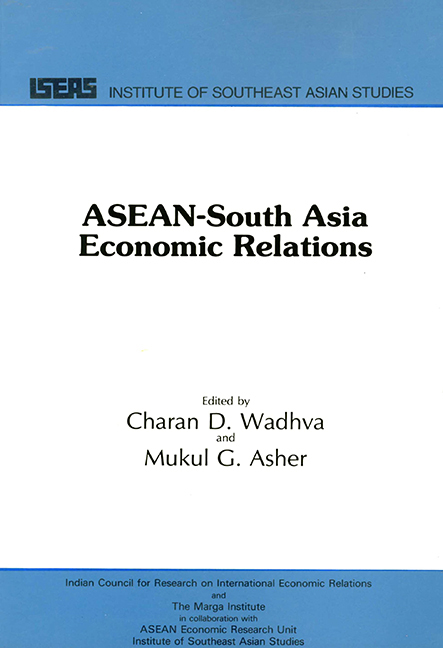Book contents
- Frontmatter
- Contents
- Foreword
- Exchange Rates of ASEAN and South Asian Countries
- An Overview
- PART ONE ASEAN COUNTRY STUDIES
- PART TWO SOUTH ASIA COUNTRY STUDIES
- Bangladesh-ASEAN Trade Relations
- Bangladesh-ASEAN Investment Relations
- India-ASEAN Economic Relations
- Nepal-ASEAN Economic Relations
- Sri Lanka-ASEAN Economic Relations
- Postscript
- Appendix SITC Classification at One-, Two-, and Three-digit Levels
- THE EDITORS
Bangladesh-ASEAN Investment Relations
from PART TWO - SOUTH ASIA COUNTRY STUDIES
Published online by Cambridge University Press: 21 October 2015
- Frontmatter
- Contents
- Foreword
- Exchange Rates of ASEAN and South Asian Countries
- An Overview
- PART ONE ASEAN COUNTRY STUDIES
- PART TWO SOUTH ASIA COUNTRY STUDIES
- Bangladesh-ASEAN Trade Relations
- Bangladesh-ASEAN Investment Relations
- India-ASEAN Economic Relations
- Nepal-ASEAN Economic Relations
- Sri Lanka-ASEAN Economic Relations
- Postscript
- Appendix SITC Classification at One-, Two-, and Three-digit Levels
- THE EDITORS
Summary
INTRODUCTION
A joint venture, or more specifically, a joint international business venture is a vehicle through which a less developed country such as Bangladesh can import capital, equipment, technology and managerial skills. The central concept of a joint venture is partnership for mutual benefits. Joint ventures are primarily based on equity shares. But there are non-equity joint ventures also. The latter type includes arrangements for the provision of technical services, franchise and brand-use agreements, construction and other job-performance contracts, licensing or rental arrangements and sharing marketing or management responsibility. In many cases, equity joint ventures also involve formal arrangements (in addition to equity) for the provision of some of the services just mentioned.
This study attempts to outline the past performance and present state of joint ventures in Bangladesh, particularly those between Bangladesh and the countries of the Association of Southeast Asian Nations (ASEAN). It also examines the related problems and prospects. It is to be noted that not all possible kinds of collaboration are covered in this study; only joint ventures with equity participation are included. Collaboration achieved by what are generally called “aided projects” through the provision of credit, grants and/or technical services is not dealt with. Non-equity joint venture collaborations, such as licensing, management contract, and so forth, are occasionally referred to with a view to elaborating a particular aspect of analysis. Investment collaboration between Bangladesh and other countries is discussed only to present a comparative position of the ASEAN countries.
Like most of the studies of this nature, a performance evaluation is seriously handicapped by the non-availability of relevant data. The analytical design is influenced by data constraints. Given this limitation, this study attempts to “measure the performance” of joint venture collaboration in Bangladesh mainly with reference to the number of ventures and countries/regions involved within sectors/subsectors.
Primary data and information were collected through personal interviews with officials of the Planning Commission and Directorate of Industries, Government of the People's Republic of Bangladesh, the public sector corporations, banks, multinational companies, and other private firms involved. Data and information available from secondary sources were also used.
- Type
- Chapter
- Information
- ASEAN-South Asia Economic Relations , pp. 253 - 268Publisher: ISEAS–Yusof Ishak InstitutePrint publication year: 1985

